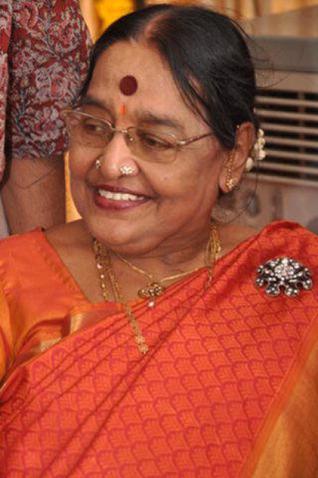
Chennai’s Carnatic music scene will sorely miss its bejewelled patron, Parimala Srinivasan.Sriram V.
It was rather appropriate that Parimala Srinivasan bowed out of this world just when Chennai is bursting at the seams with Carnatic music performances. It is almost as though the world is putting on its musical best to send her off. Yes, for her, music was life.
Parimala came from a family that was known for its music patronage. Father Aleppey Parthasarathy (Papaswami) Iyengar was a well-known lawyer who maintained open house for all musicians. Ariyakkudi was a close friend and music teacher. Parimala’s brother Aleppey Venkatesan also learnt from him. Another brother, P.S. Raghavan, learnt mridangam from Palghat Mani Iyer and later from Palghat Raghu.
G.N. Balasubramaniam was yet another favourite and to Parimala, in particular, he was a mentor and guide. She remembered fondly his singing the pallavi ‘Parimala Rangapathe’ at her wedding. Being an ordained ‘Sri Vidya Upasaka’, he performed special pujas for her well-being at crucial moments in her life. She kept his memory alive by observing GNB Day each year.
The ace violinist T.N. Krishnan was practically a family member and in his Sangita Kalanidhi acceptance speech in 1981, was to thank Papasami Iyengar and his clan for all their support and encouragement.
Marriage to V. Srinivasan, a lawyer, meant that Parimala shifted to Madras and became completely involved in the music scene here. Her first December Season was in 1956 when she attended the Music Academy sessions, on her father’s ticket. 1958 was of course special, for GNB was the Kalanidhi.
From then on, being an avid participant in the Season was a matter of routine. This did not mean restricting herself to just the star concerts and lecture demonstrations. It involved listening to several youngsters and encouraging them with her bright smile. And as for the volunteers, who manned the doors and coordinated traffic, there were acts of unspoken kindness – food in tiffin carriers would be brought in her car and handed out to them.
It was in 1970 that she co-founded Raga Tarangini, a sabha run entirely by women. She was to remain its secretary till her passing. Membership may have dwindled over the years, but nothing dimmed her enthusiasm. Monthly concerts were organised till the end, as was GNB Day. Over the 44 years that she ran it, almost every one of the performing artists of today was given concert opportunities by her. Most of them remembered her various gestures of kindness with affection.
No regular music concert-goer could remain immune to her charm and friendliness. Beginning with 1993 when I first came to this city, I too was drawn into this circle. As she talked of her life, I realised that she too, like everyone else, had had her shares of trials and tribulations. But she never had any bitterness and always laughed everything off. Besides, there was always music.
To her, life was an extraordinary celebration. She would always be brightly dressed and wear a number of jewels – some of them of an earlier age and time – brooches and the like. And this was not only for concerts. On one occasion, I ran into her at an open-air folk arts festival at Nageswara Rao Park. It was quite dark and there she was all bejewelled. I asked her if it was not a risk that she was taking. To this she replied that she was not going to change her way of life for the sake of some thief who may never come anyway! Happily for her, he never did. And if he had, he would have become her friend for life and never dreamt of hurting her.
On yet another occasion, I called at her residence. I asked her about a metal rail with a chair attached that ran all the way up the stairs to her first floor home. She replied that it was her son’s arrangement so that she did not strain her knees. And then, very cheerfully, she sat on the chair, pressed a switch and demonstrated to me as to how she went up and down the contraption. All this, with not a trace of bitterness about old age and its complaints.
Standing on the terrace of her house on that occasion, after I had been fed with special Bengal style samosas (“I knew you would like it, you are after all a Calcuttan”), she declared that not an evening passed without her attending a concert. Then spreading her arms expansively, she declared that there were at least six sabhas within a kilometre radius of where she lived. Others would have thought of supermarkets or hospitals.
The world of Carnatic music is that much poorer by way of losing a patron.
Adieu, sweet lady! May flights of angels ‘sing’ thee to thine rest!
source: http://www.thehindu.com / The Hindu / Home> Features> Friday Review> Music / by Sriram .V / December 25th, 2014